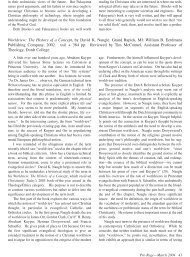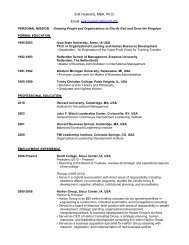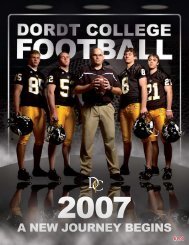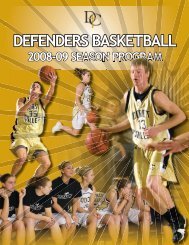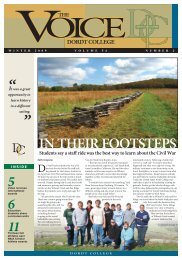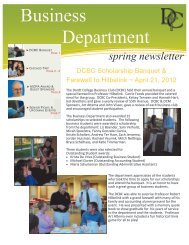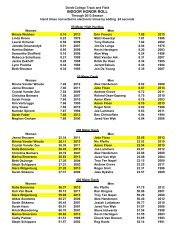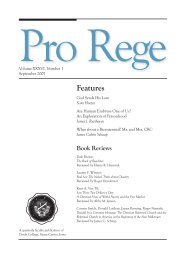June 2009 - Dordt College
June 2009 - Dordt College
June 2009 - Dordt College
Create successful ePaper yourself
Turn your PDF publications into a flip-book with our unique Google optimized e-Paper software.
Book Reviews<br />
Cacioppo, John T., & Patrick, William. Loneliness: Human Nature and the Need for Social Connection. New<br />
York: W.W. Norton & Company, 2008. 317 pp. ISBN: 978-0-393-06170-3. Reviewed by Jessica Clevering,<br />
Instructor of Psychology at <strong>Dordt</strong> <strong>College</strong>, Iowa.<br />
My housemate once said that loneliness is the emotional<br />
equivalent to chronic back pain: you wrestle yourself out of<br />
bed in the morning and push yourself through the day, but<br />
it is still always there.<br />
Loneliness can cause this kind of pain because,<br />
according to psychologist and University of Chicago<br />
professor John Cacioppo, human beings require social<br />
connection. He should know: he has studied the individual<br />
in society for the past three decades. Cacioppo is perhaps<br />
best known for his work in the area of persuasion, but he<br />
has also conducted research in almost every area of social<br />
psychology, from political behavior to neuropsychology.<br />
Relevant to this book, Cacioppo conducts longitudinal<br />
research to track changes in loneliness over time and<br />
compares them to changes in physical health.<br />
Cacioppo and his co-author, science writer William<br />
Patrick, use the results of this study and many others to<br />
illustrate the basic human need for social connection.<br />
Through his book, Cacioppo intends to “help the socially<br />
satisfied get from good to great, while at the same time<br />
helping the lonely regain control of their lives” (19).<br />
Although this goal seems like the thesis of a self-help book,<br />
Cacioppo dedicates most of the book to describing research<br />
rather than offering advice.<br />
The first chapter primes the reader for a book about<br />
subjective feelings of loneliness and how to overcome them.<br />
Cacioppo begins by explaining the construct of loneliness<br />
and how it can be measured. The commonly-used UCLA<br />
Loneliness Scale contains questions like, “How often do<br />
you feel that no one knows you well” and “How often do<br />
you feel that you lack companionship” Cacioppo found<br />
that subjective feelings of loneliness (how lonely a person<br />
feels) were a better predictor of physical health than an<br />
objective measure of isolation (the actual number of friends<br />
and connections a person has).<br />
The rest of the book is about its subtitle, human nature<br />
and the need for social connection, and the research that<br />
bears on this question. For example, Cacioppo describes<br />
studies in which participants who were made to feel socially<br />
rejected engaged in more imitative behaviors than those<br />
who were not rejected. Specifically, when some started<br />
shaking their foot, these participants more often began to<br />
shake their foot as well. In another study, participants were<br />
given a survey and the researchers pretended to calculate<br />
the results. Half of the participants were randomly selected<br />
to be told that their results showed they would probably<br />
be alone for the rest of their lives. The other half of the<br />
participants were told they would probably always have<br />
meaningful relationships. The research revealed that when<br />
people were told that they would probably be alone for<br />
the rest of their lives, they performed more poorly on<br />
subsequent memorization and logic tests than people<br />
who were given the prediction of companionship. These<br />
studies suggest the importance of social connection for<br />
everyday functioning. In his overview of social connection,<br />
Cacioppo includes a range of research, such as oxytocin<br />
levels in prairie voles, sex behaviors among bonobos, obesity<br />
in friendship groups, and human sleep patterns. He uses<br />
plenty of case studies and examples to illustrate his points<br />
and comments on scholars from Hobbes and Descartes to<br />
Darwin and E.O. Wilson. He even includes poets like John<br />
Donne to emphasize the importance of social connection<br />
for human functioning.<br />
In discussing social connections, however, he glosses<br />
over the distinction between loneliness (the subjective<br />
and negative emotion) and aloneness (objective social<br />
isolation). This is unfortunate, because Cacioppo’s own<br />
research shows that the two do not exist in a one-to-one<br />
correlation. A person who feels very lonely might have<br />
extensive social connections, and a person can be socially<br />
isolated without feeling lonely. Cacioppo especially neglects<br />
this distinction when he uses evolutionary psychology to<br />
explain the subjective feeling of loneliness as an adaptive<br />
reaction to isolation. Early human beings would have<br />
needed to be socially connected in order to survive in<br />
harsh environments. Those with the tendency and ability<br />
to make social connections and maintain social ties would<br />
have been more likely to survive by creating societies that<br />
divided labor and engaged in reciprocal care-taking. Those<br />
who were not part of a group would not survive to pass<br />
on their genes. Thus, loneliness is an emotion that signals<br />
the danger of ostracism, as the ostracized could not survive<br />
on their own. In other words, the negative emotion of<br />
loneliness should impel a person to seek community and<br />
thereby survive.<br />
Cacioppo’s use of evolutionary psychology as an<br />
explanatory device detracts from the rich research he<br />
presents in his book, some of which seems to contradict<br />
his evolutionary explanation. For example, he states<br />
that loneliness is an adaptive emotion, driving people<br />
22 Pro Rege—<strong>June</strong> <strong>2009</strong>




